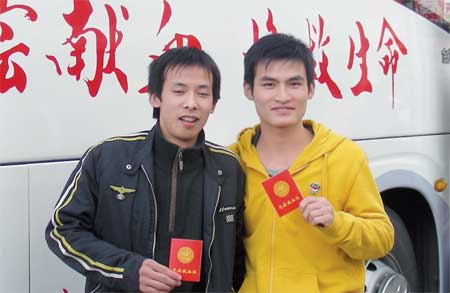A right bloody mess
China legally replaced its paid blood donor system with a voluntary system in 1998 after a series of tainted blood catastrophes, most famously in Henan Province where hundreds of peasants were accidentally infected with the HIV virus and have since struggled to obtain any compensation.
 |
|
Restaurant waiters He Hu, 19, (left) and Liu Yuan, 20, from Xinyang, a prefecture-level city in Henan Province, donate for the first time. |
Stricter laws followed for donating blood, making it illegal to sell blood without approval. Despite their best efforts, the authorities found few could forget what had happened in Henan, and many a would-be donor remains resentful of smooth official assurances.
"If the instruments, especially the needles, could be guaranteed as safe and fully protective of donor's health, I bet there'd be no blood shortage," said Li Xiang, a Yunnan TV station staff member.
Although the government-sanctioned blood quota system - whereby danwei or work units rounded up "volunteer" employees to donate for welfare perks and benefits - officially ended in 2006, the latest crisis has seen a reluctant return to the old ways: One employee of a neighborhood committee in Shanghai was reportedly punished on November 10 for illegally offering payment for blood to meet his committee's quota for voluntary donations.
Nor was trust engendered when pictures appeared on popular websites last year showing a packet of blood from Chengdu blood center being used as fertilizer for orchids.
Under the new laws if a person donates a large amount of blood over the years then he and certain family members are entitled to be reimbursed for any blood they receive at hospital.
In reality, Web user jmlms in Qingdao tells a different story.
After donating 2,600 milliliters of blood over the last six years, he found the hospital refused to repay him 280 yuan for his father's blood transfusion.
"The hospital said 160 yuan could be reimbursed, but another 120 yuan for blood storage could not," he wrote on a sina.com forum.
China Central Television (CCTV) employee Yang Liu's father also got no money back for his heart attack surgery, despite years of blood donations.
Yang was kicked between hospital and blood center with both sides saying the other should pay.
"Although we didn't donate with the idea of getting free blood later, we still feel bitterly disappointed when my father finally came to use the blood," she said.
"I had planned one day to donate blood myself, but after witnessing what happened to my father, I will never donate."
 0
0 






